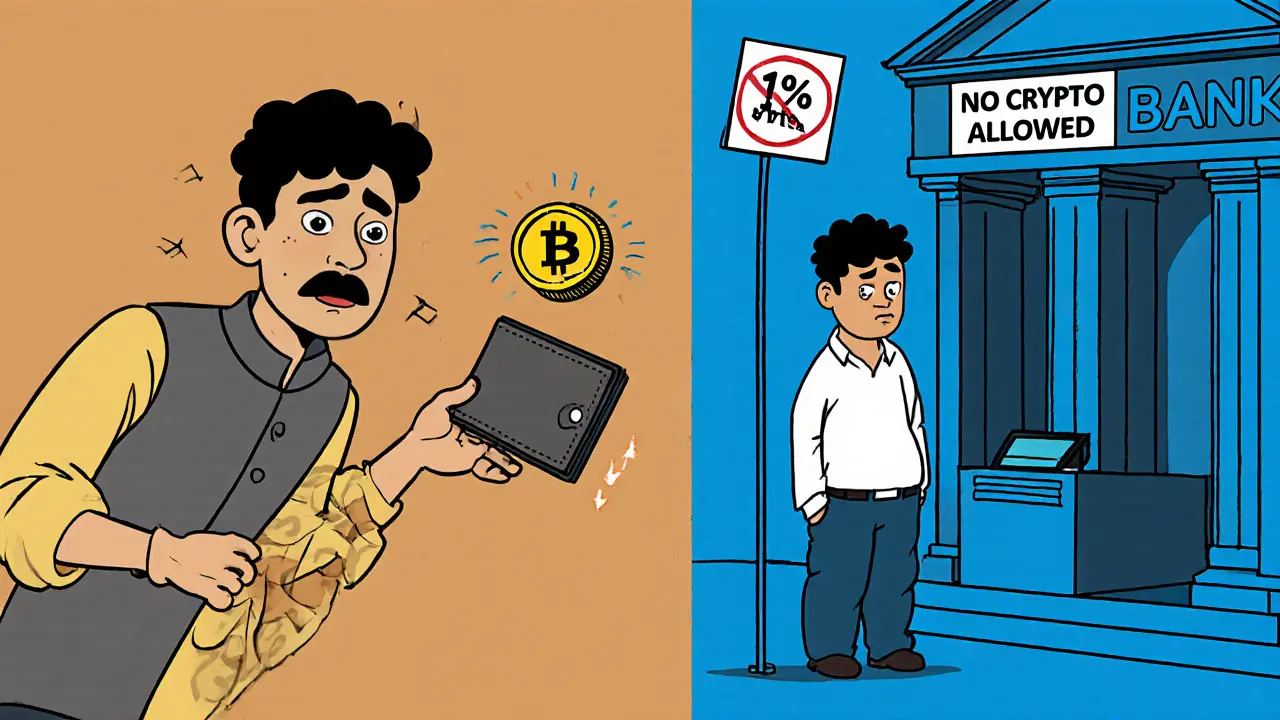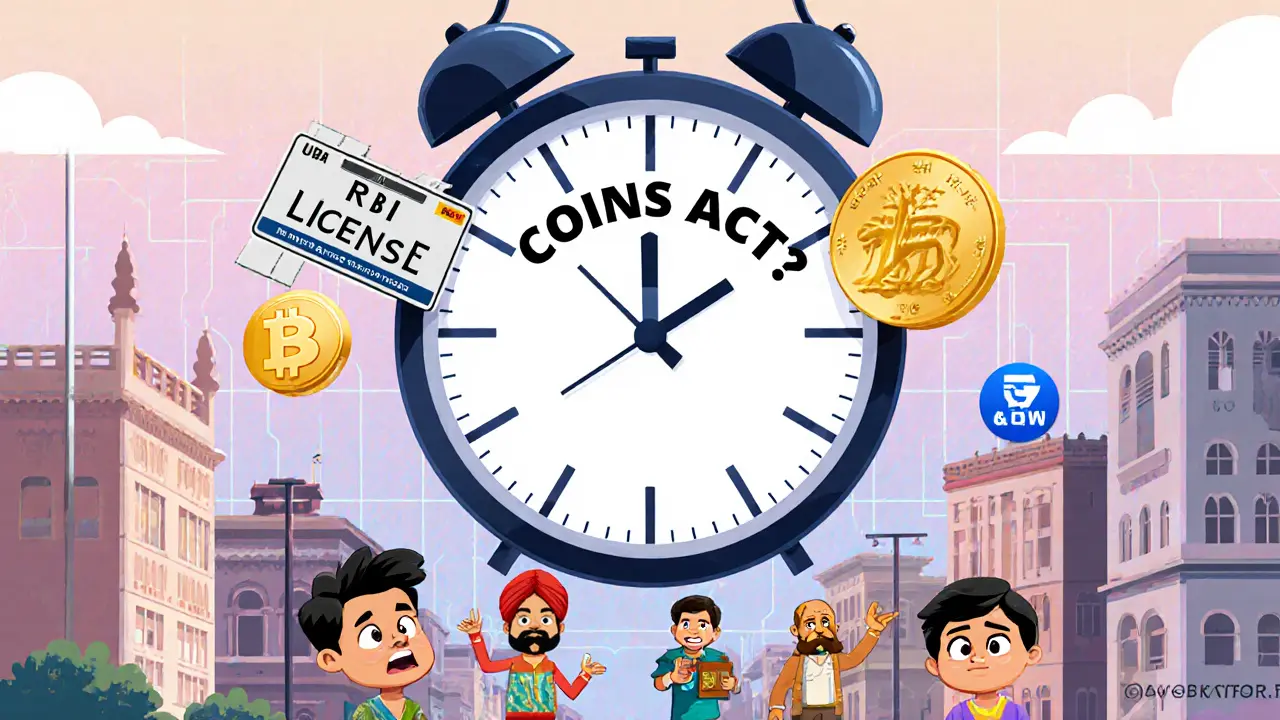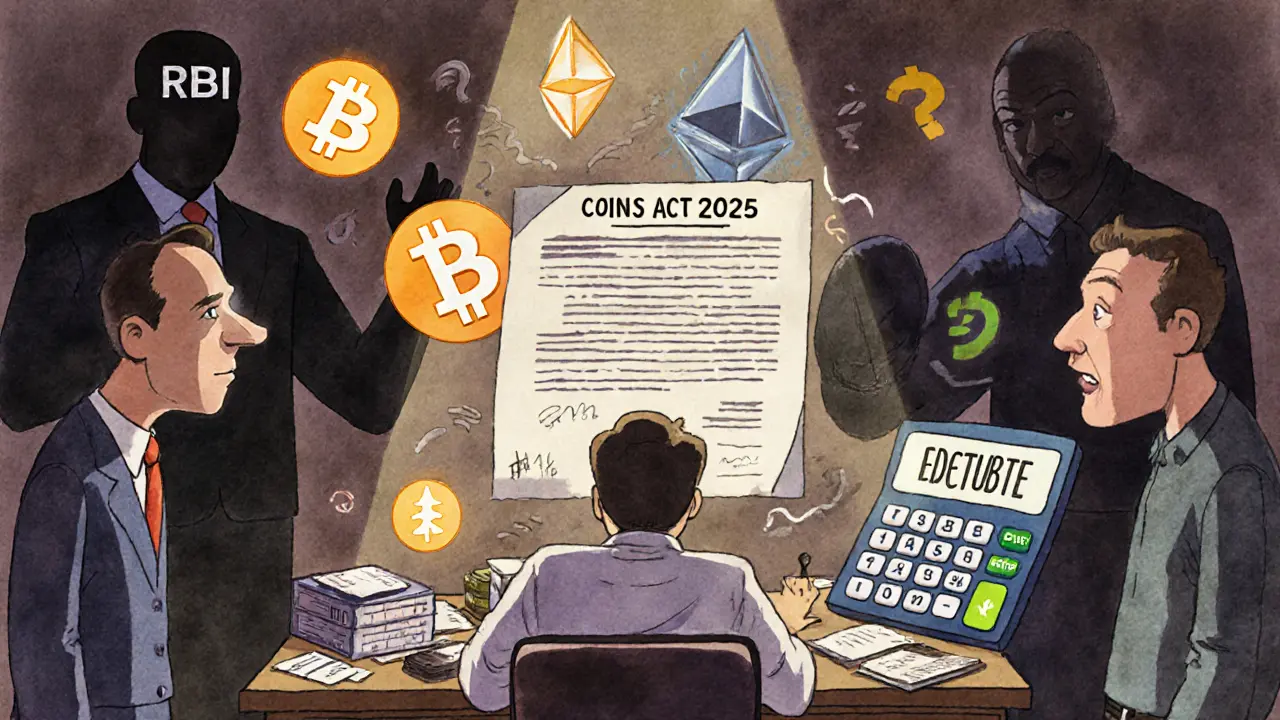India Crypto Tax Calculator
Calculate Your Net Profit
India's crypto tax structure is unique. With 30% tax on profits and 1% TDS on transfers, your actual profit can be significantly reduced. Calculate how much you'll keep after taxes.
Profit Tax
Transfer Tax (TDS)
Net Profit
India’s crypto market isn’t banned. It’s not legal either. It exists in a gray zone where you can trade, but the government won’t say if you’re playing by the rules-or breaking them. As of October 2025, millions of Indians are buying, selling, and holding Bitcoin, Ethereum, and other digital assets, all without a clear legal framework to protect them. The result? A market full of opportunity, but also full of risk.
Trading is allowed, but taxed like a luxury
You can’t buy a pizza with Bitcoin in India. You can’t pay your rent with Ethereum. The government doesn’t recognize crypto as money. But you can trade it-and you’ll pay 30% tax on every profit. That’s not a capital gains rate. That’s a flat tax, no deductions, no offsets. Even if you lost money on other trades, you still owe 30% on what you made.
On top of that, every time you transfer crypto between wallets or exchanges, a 1% tax is deducted at source (TDS). So if you sell $1,000 worth of Bitcoin, $10 vanishes before you even see the cash. And if you move it to a cold wallet? Still taxed. The government doesn’t care if you’re holding or trading-you’re taxed on movement.
This isn’t regulation. It’s taxation with a side of deterrence. The Ministry of Finance isn’t trying to build a crypto ecosystem. It’s trying to make it expensive enough that people give up.
Who’s in charge? No one really
Here’s the mess: no single agency controls crypto in India. The Reserve Bank of India (RBI) says crypto is a threat to financial stability. The Securities and Exchange Board of India (SEBI) says it should be regulated like stocks. The Ministry of Finance says it’s a taxable asset. The Supreme Court already overturned the RBI’s 2018 banking ban, so banks can’t legally block crypto transactions-but many still do, quietly.
That means you’re trading on platforms like CoinDCX, WazirX, or ZebPay-exchanges that have their own rules, not government ones. They collect your ID, verify your phone, and report your trades to the tax department. But if the exchange gets shut down tomorrow? Your funds could vanish with no legal recourse.
The RBI is busy building its own digital rupee, a central bank digital currency (CBDC). Meanwhile, private crypto is treated like an inconvenient cousin-allowed in the house, but never invited to dinner.
The COINS Act 2025: Hope on the horizon?
The closest thing India has to a crypto law is the proposed COINS Act 2025. It’s not law yet. It’s not even a bill in Parliament. But it’s the first serious attempt to define what crypto actually is, who can run exchanges, and how to protect users.
If passed, the COINS Act would:
- Require all crypto exchanges to get a license from the RBI
- Define digital assets clearly to avoid legal confusion
- Clarify tax deductions for trading fees and losses
- Set up consumer protection rules against scams and fake platforms
- Force exchanges to follow global standards like anti-money laundering rules
This isn’t radical. It’s modeled after Europe’s MiCA regulation and Japan’s balanced approach. But the government hasn’t said when it’ll be introduced. Or if it’ll pass. Or what version will survive the bureaucracy.
For traders, that means holding crypto feels like sitting on a ticking clock. You’re not just betting on price. You’re betting on whether the government will change the rules overnight.

What traders are really feeling
On Reddit threads and Telegram groups, Indian crypto traders are split. Some see the chaos as a chance. "I bought Ethereum in 2021 when no one was talking about it," says Anita, a software engineer from Bangalore. "Now I’ve got a six-figure portfolio. But I don’t tell my bank. I don’t tell my family. I just hope the tax man doesn’t come knocking."
Others are leaving. "I moved half my portfolio to Binance and use a VPN," says Raj, a trader from Pune. "The 30% tax kills any real return. If I can’t keep more than 70% of my profits, why bother?"
There are success stories. A few early adopters turned small investments into life-changing gains. But they all say the same thing: the stress isn’t from price swings. It’s from not knowing if tomorrow’s news will wipe out their holdings.
Platforms like CoinDCX have added tax calculators and auto-reporting tools. But these aren’t legal safeguards. They’re just convenience features. If the government decides to freeze accounts or ban a platform, those tools won’t save your coins.
How this compares to the rest of the world
Compare India to the U.S. or EU. In the U.S., crypto is regulated by the SEC, IRS, and CFTC. You know which agency handles what. In the EU, MiCA gives clear rules for exchanges, stablecoins, and investor protections.
Japan licenses exchanges, requires audits, and taxes crypto like property-15-55%, depending on income. Singapore lets you trade under a sandbox, with clear rules and oversight.
India does none of that. It’s not as strict as China, which banned everything. But it’s not as open as Switzerland, where crypto firms can set up headquarters without fear. India is in between-allowing trade but refusing to legitimize it.
That makes India one of the most unpredictable markets in the world for crypto. You’re not just trading a volatile asset. You’re trading a political gamble.

The real cost of trading in India
Let’s say you invest ₹5 lakh in Bitcoin. In a year, it doubles to ₹10 lakh. You sell. You owe ₹1.5 lakh in tax (30% of ₹5 lakh profit). Then you transfer the ₹8.5 lakh to your bank. Another ₹8,500 is taken as TDS. You’re left with ₹8.415 lakh. Your net profit? ₹3.415 lakh.
Compare that to stocks. In India, long-term equity gains are taxed at 10% after ₹1 lakh. No TDS. No hidden fees. You can offset losses. You can hold for years without being taxed on every transfer.
Crypto doesn’t get that. It’s treated like a gambling win, not an investment.
And that’s the problem. The tax system doesn’t encourage long-term holding. It punishes movement. That kills innovation. It pushes traders toward offshore platforms. It drives activity underground.
What you can do right now
If you’re trading in India, here’s what you need to do-today:
- Track every transaction. Use apps like KoinX, CoinTracker, or even Excel. Record buys, sells, transfers, and gas fees.
- Save your KYC documents. Exchanges may change. You need proof you owned the assets.
- Don’t rely on exchange reports. They’re helpful, but not legally binding. Keep your own records.
- Consult a CA who understands crypto. Most chartered accountants don’t. Find one who’s filed crypto taxes before.
- Don’t assume regulation is coming soon. The COINS Act could take years. Or never pass.
There’s no safety net. No insurance. No government backstop. If you lose your keys, or an exchange gets hacked, you’re out of luck.
Is it worth it?
Some traders say yes. They see India’s crypto market as a sleeping giant. With 1.4 billion people, even 5% adoption means hundreds of millions of users. The government may eventually realize it can’t stop this-it can only control it.
Others say no. The tax burden is too high. The risk is too great. The uncertainty is too exhausting. Why risk your savings on a market that could vanish with a single tweet from the Finance Minister?
The truth? India’s crypto scene is a high-stakes experiment. You’re not just trading digital assets. You’re betting on whether the state will ever decide to join the modern financial world-or stay stuck in fear.
Right now, you can trade. But you’re doing it on someone else’s terms. And those terms can change tomorrow.
Is crypto legal in India?
Crypto isn’t illegal in India, but it’s not officially recognized either. You can buy, sell, and hold digital assets, but they’re not legal tender. The government taxes them heavily and has not passed any law to regulate exchanges or protect users.
What’s the crypto tax rate in India?
India taxes all crypto profits at a flat 30%, with no deductions for losses or trading fees. Additionally, a 1% tax deducted at source (TDS) applies to every crypto transfer above a certain threshold, regardless of whether you made a profit.
Can banks block crypto transactions in India?
No, banks can’t legally block crypto transactions after the Supreme Court overturned the RBI’s 2018 ban. But some banks still do it informally-freezing accounts or refusing to process crypto-related payments without explanation.
Is the COINS Act 2025 going to pass?
As of October 2025, the COINS Act is still a proposal. It has not been introduced in Parliament, and there’s no confirmed timeline for its passage. It outlines a licensing system for exchanges and clearer tax rules, but its future remains uncertain.
What happens if the government bans crypto?
If India bans crypto, existing holdings may not be confiscated-but trading and exchanges would be shut down. You’d still own your coins, but you wouldn’t be able to sell them legally within India. Converting to fiat would become extremely difficult, and platforms could be blocked or seized.
Should I use Indian or international exchanges?
Indian exchanges like CoinDCX and WazirX comply with tax reporting and KYC, making them safer for tax compliance. International exchanges offer more coins and lower fees but don’t report to Indian authorities, increasing your risk of non-compliance. Using both carries higher complexity and legal exposure.
Can I claim crypto losses on my tax return?
No. India’s tax law doesn’t allow you to offset crypto losses against other income or future gains. Even if you lost money on 10 trades, you still pay 30% on every single profit-no deductions allowed.
Is crypto trading safe in India?
It’s as safe as the platform you use-but no platform is government-backed. Exchanges can be hacked, shut down, or frozen without warning. There’s no deposit insurance, no legal recourse if funds disappear. You’re responsible for your own security.

9 Comments
Bro, India’s crypto scene is like watching a wild west movie where the sheriff is on vacation, the saloon owner is also the bank, and everyone’s got a taxman with a flamethrower behind the curtain 🔥💰
They’re taxing movement like it’s a sin, not a transaction. The 30% flat tax? That’s not regulation-that’s psychological warfare. And TDS on wallet transfers? Bro, that’s not a fee, that’s a punishment for existing. But hey-this chaos? It’s where the real alpha lives. If you can survive this, you can survive anything. The future belongs to the unregulated. And right now, India’s the most exciting lab on Earth.
Stop glorifying this mess. You think crypto is some kind of rebellion? It’s just gambling with extra steps and worse odds. The government is right to tax it like a luxury-because that’s what it is. People are risking their life savings on memes and hype, then crying when they lose. And you call that innovation? Wake up. India needs stability, not crypto bros pretending they’re Satoshi.
Oh my GOD. This is why America is still winning. India’s trying to tax digital assets like they’re slot machines? That’s not policy-that’s panic. You don’t tax movement, you tax PROFIT. And TDS on EVERY transfer? That’s not a tax system, that’s a middle finger to innovation. If I were Indian, I’d move my coins to Binance and VPN my way to freedom. This is why the next crypto billionares won’t come from Mumbai-they’ll come from Miami, because someone there actually understands money.
So… let me get this straight. You can own crypto, but you can’t spend it. You can trade it, but the government takes 30% no matter what. You can’t even move it without paying a toll. And nobody knows who’s in charge. That’s not a market. That’s a horror movie where the monster is bureaucracy. I just… I don’t even know what to say. I’m just sitting here, holding my Bitcoin, wondering if the next tweet from the Finance Minister is gonna be my funeral notice.
Honestly? I feel you. I’ve been watching this unfold from afar. The emotional toll here is way bigger than the financial one. It’s not about the 30% tax-it’s about the constant anxiety. Is today the day they ban it? Will my exchange vanish? Will my bank freeze me for no reason? It’s exhausting. I know people who’ve made millions, but they’re terrified to celebrate. That’s not freedom. That’s survival mode. And honestly? That’s the most dangerous thing of all-when the fear becomes the biggest risk.
Let’s be precise: the 30% tax on crypto profits is not a capital gains tax-it is a flat, non-deductible, non-offsettable levy, which is unprecedented in any major economy. Additionally, the 1% TDS on every transfer, regardless of profit or intent, constitutes a de facto transaction tax on asset mobility-a policy that actively discourages portfolio management and incentivizes hoarding. This is not merely bad policy; it is economically irrational. And the absence of legal clarity? That is not a gray zone-it is regulatory nihilism.
It’s funny how people act like crypto is the future. It’s just… digital tulips with extra steps. And India? They’re not stopping it-they’re just making it boring. Taxing every little movement? That’s not control. That’s boredom with consequences. I mean, why bother? If you’re gonna get taxed on moving your coins like they’re contraband… just keep it in your wallet. Let the others play. I’ll be over here, reading a book. With paper. Real paper.
ok but like… i get why people are stressed. i have a friend in bangalore who bought eth in 2021 and now she’s got like… 8 lacs in profit? but she’s scared to tell anyone. not even her mom. and she’s got this whole spreadsheet thing going on. it’s wild. i just want her to relax. like… it’s just money. but i know it’s not. it’s stress with a blockchain. 🥲
India’s crypto paradox is a mirror for the global dilemma: technological advancement outpaces institutional evolution. The COINS Act 2025, even if it passes, will be a compromise-neither fully embracing decentralization nor fully rejecting it. What we’re witnessing is not merely regulatory ambiguity, but a cultural negotiation between tradition and disruption. The Indian trader is not merely a speculator-they are a reluctant pioneer, navigating a financial frontier where the map is being drawn in real time, with ink made of taxes, fear, and hope. The world is watching. And perhaps, one day, India will not be seen as an outlier-but as the crucible where modern finance learned to breathe.